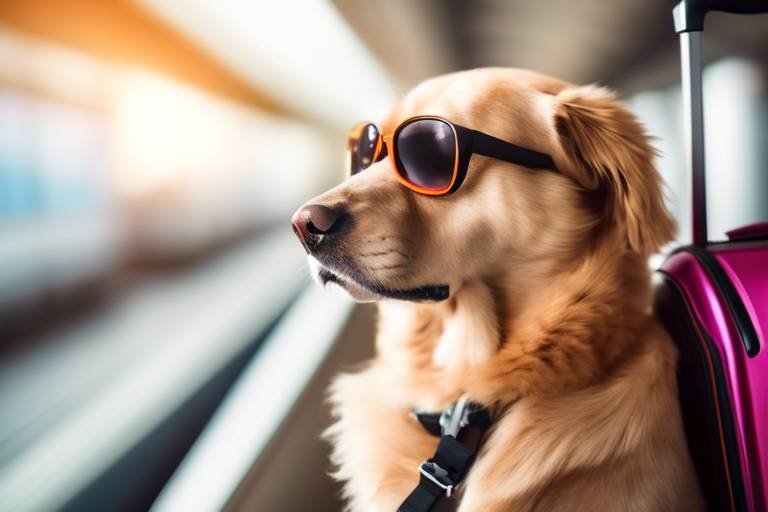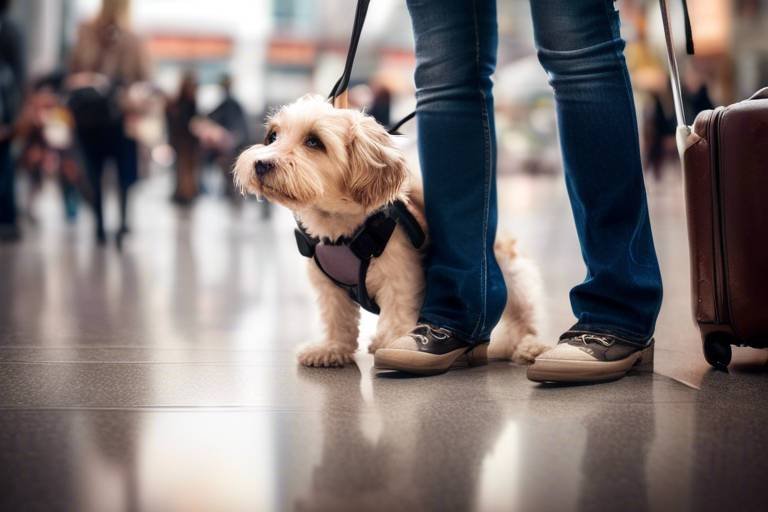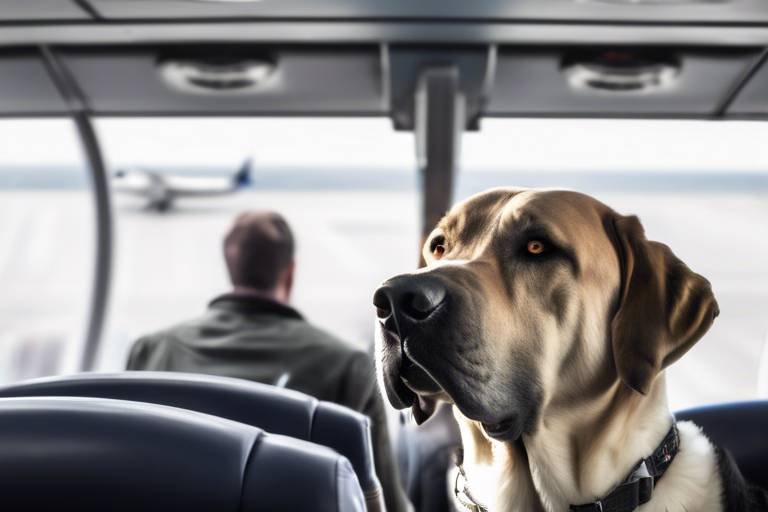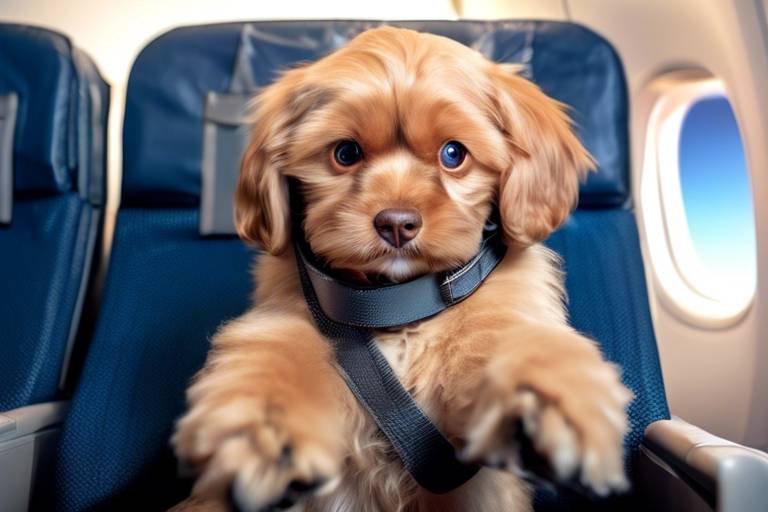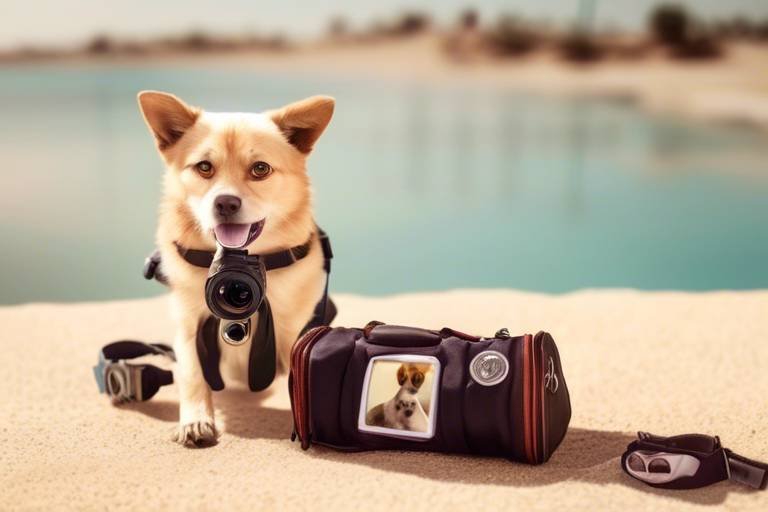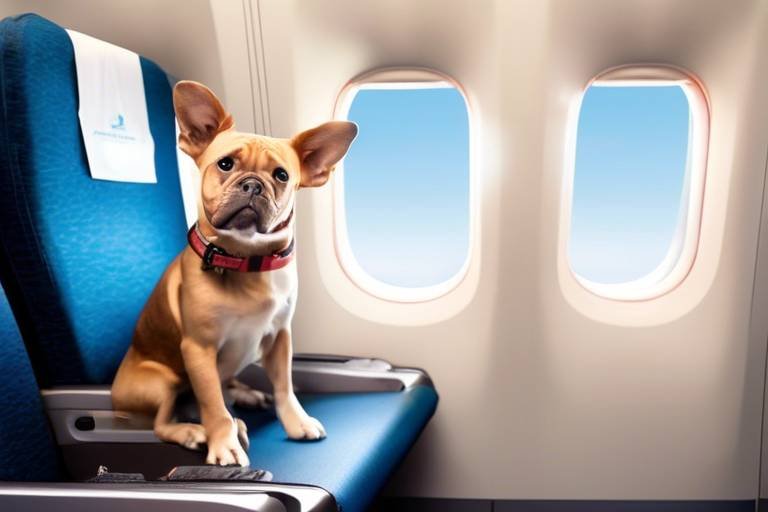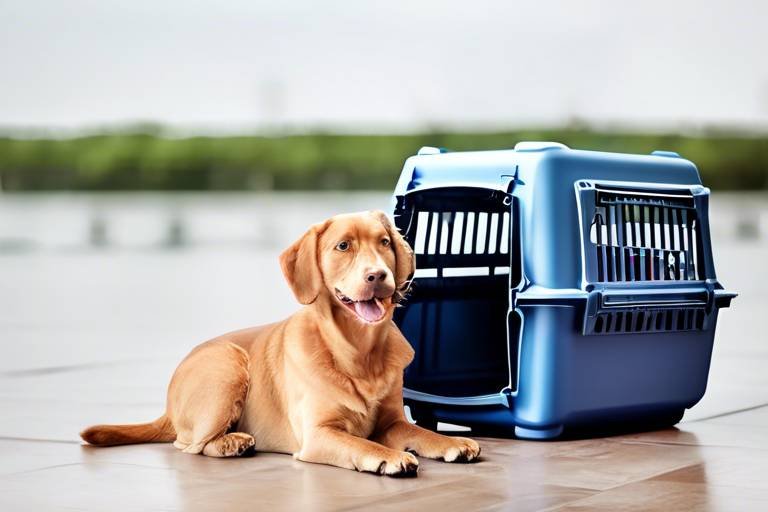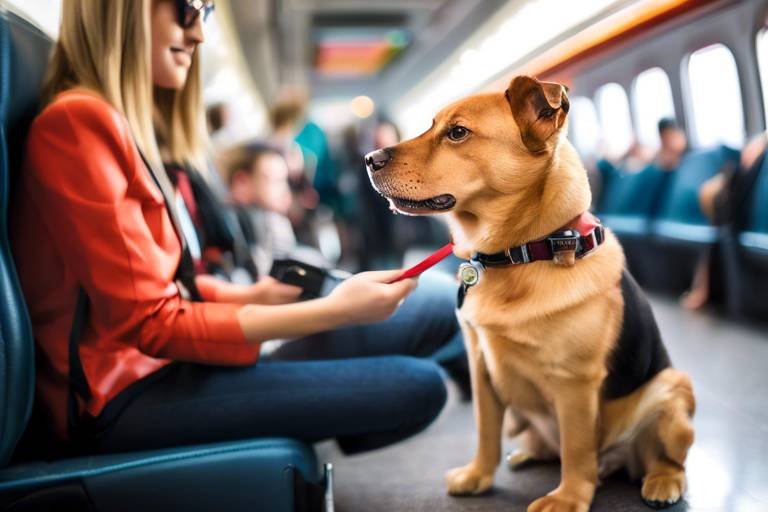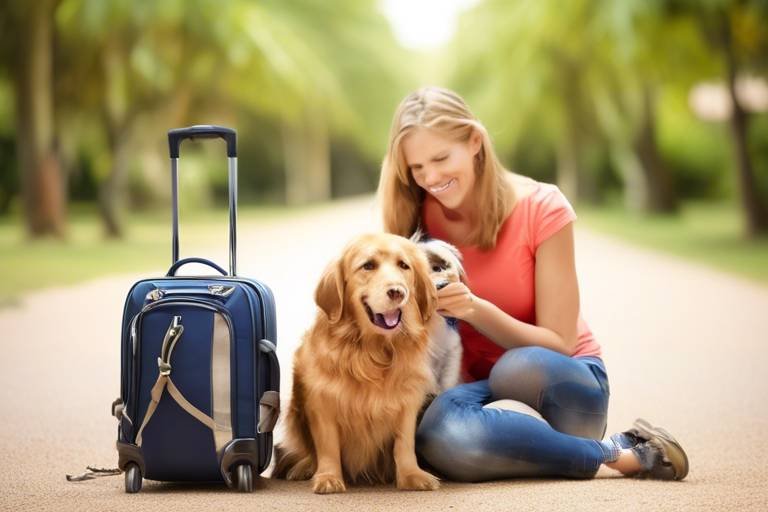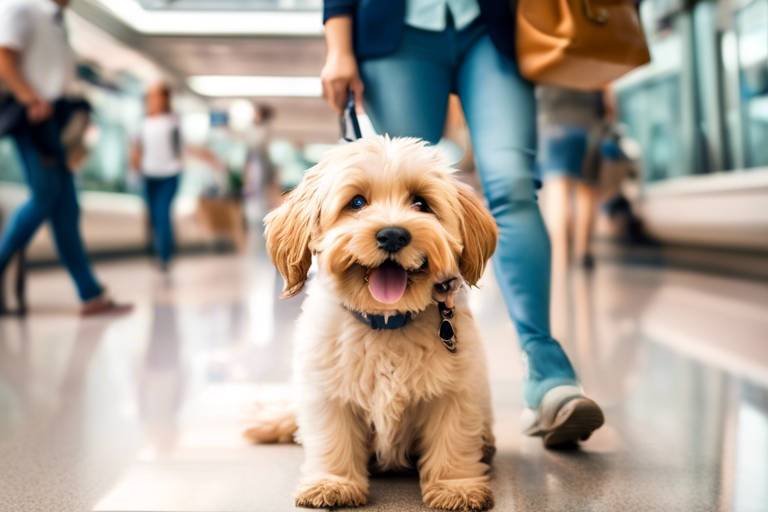Tips for Managing Pet Allergies While Traveling
Traveling with pets can be a delightful experience, but for many pet owners, it comes with the challenge of managing allergies. If you or someone in your family suffers from pet allergies, the thought of embarking on a trip can feel overwhelming. But fear not! With some practical strategies and a little preparation, you can ensure that both you and your furry companions enjoy a comfortable and memorable journey. This article will guide you through essential tips for managing pet allergies while traveling, making your adventures as enjoyable as possible.
Pet allergies are more common than you might think, and they can lead to a range of uncomfortable symptoms such as sneezing, itchy eyes, and even skin rashes. Understanding what triggers these allergies is crucial, especially when you're in a new environment where different allergens may be present. Common triggers include pet dander, saliva, and urine. The key to managing these allergies lies in recognizing the symptoms early on and knowing how to respond effectively. It's like being a detective—spotting the clues and taking action before things get out of hand!
Preparation is your best friend when it comes to managing allergies on the go. Before you set off on your adventure, take a moment to think about your travel plans. Here are some steps to consider:
- Consult your doctor about any medications you might need.
- Make a list of allergy-friendly accommodations.
- Pack your essential allergy medications and supplies.
By planning ahead, you can minimize stress and ensure a smoother travel experience. Imagine embarking on your journey with confidence, knowing you've taken the necessary steps to keep allergies at bay!
When it comes to finding a place to stay, not all accommodations are created equal. Opt for hotels or rentals that prioritize cleanliness and have a reputation for being allergy-aware. Look for properties that offer:
- Pet-free rooms
- Hardwood floors instead of carpets
- Air purifiers and hypoallergenic bedding
By selecting the right environment, you can significantly reduce your exposure to allergens. Think of it as creating a safe haven amidst the chaos of travel!
Having the right medications on hand can make all the difference when managing pet allergies while traveling. Here’s a quick checklist of essential items to include in your travel kit:
- Antihistamines for immediate relief
- Inhalers if you have asthma
- Nasal sprays to combat congestion
- Allergy eye drops for itchy eyes
Keep these items easily accessible in your carry-on bag, so you can quickly address any allergy symptoms that arise. Being prepared is like having a safety net; it gives you peace of mind to fully enjoy your trip!
While traveling, you may encounter new allergens that can trigger your symptoms. To keep your allergies in check, here are some strategies to consider:
- Keep your living space tidy by regularly cleaning up pet hair and dander.
- Use air purifiers if possible to filter out allergens.
- Avoid touching your face, especially your eyes, after petting animals.
By maintaining a clean environment, you can significantly reduce the chances of an allergic reaction. Think of it like being a gardener—tending to your surroundings to keep the weeds (allergens) at bay!
To ensure a comfortable travel experience, it's essential to minimize your exposure to allergens. Here are some practical steps you can take:
- When in public spaces, try to stay away from areas where pets are commonly found.
- Bring along allergy-friendly cleaning supplies to wipe down surfaces.
- Consider using a travel-sized air purifier in your hotel room.
By taking these precautions, you can create a buffer between yourself and potential allergens, allowing you to focus on enjoying your trip instead of worrying about sneezing fits!
Effective communication with your travel companions is crucial for a smooth journey. Before you hit the road, discuss your allergy needs and preferences openly. Let them know what to expect and how they can help you manage your allergies. This collaborative approach can enhance everyone's travel experience and ensure that you feel supported throughout the trip. After all, teamwork makes the dream work!
Once your adventure comes to an end, it's essential to manage any lingering allergy symptoms. Here are some tips to consider:
- Change your clothes and shower to remove any allergens that may have clung to you.
- Wash your bedding and vacuum your home to eliminate any residual pet dander.
- Monitor your symptoms and consult a doctor if they persist.
By taking these steps, you can return to a healthy environment and kickstart your recovery. It's like giving your home a fresh start after a whirlwind adventure!
1. What are common symptoms of pet allergies?
Common symptoms include sneezing, runny or stuffy nose, itchy eyes, and skin rashes.
2. Can I travel with my pet if I have allergies?
Yes, but it requires careful planning and management to ensure your comfort.
3. What should I do if I have an allergic reaction while traveling?
Take your allergy medications as prescribed and seek medical attention if symptoms worsen.
4. How can I find allergy-friendly accommodations?
Look for hotels that advertise pet-free rooms and check reviews for cleanliness.
5. Is it safe to use air purifiers in hotel rooms?
Yes, they can help filter allergens and improve air quality.

Understanding Pet Allergies
Pet allergies can be a real downer for animal lovers. Imagine wanting to cuddle with your furry friend but instead feeling a sneeze attack coming on! It’s not just a minor inconvenience; pet allergies can lead to significant discomfort and health issues. Understanding what triggers these allergies and recognizing the symptoms is crucial, especially when you’re traveling to new places where different allergens might lurk.
So, what exactly causes pet allergies? Most commonly, it's the proteins found in a pet's skin cells, urine, and saliva. When these proteins become airborne or settle on surfaces, they can trigger allergic reactions in sensitive individuals. You might be surprised to learn that it’s not just the fur that’s the culprit; even hairless breeds can produce allergens! This means that if you’re planning a trip with your pet or visiting friends with pets, you need to be aware of your surroundings and how they might affect your allergies.
Common symptoms of pet allergies include:
- Itchy or watery eyes
- Sneezing and nasal congestion
- Skin rashes or hives
- Shortness of breath or wheezing
These symptoms can vary from person to person, and they can sometimes mimic other conditions, making it tricky to pinpoint the exact cause. If you find yourself experiencing these symptoms, it’s wise to consult with a healthcare professional to confirm that pet allergies are indeed the issue. They may recommend allergy testing or prescribe medications to help manage your symptoms.
Another important aspect is understanding the different types of allergens that might be present in various environments. For example, if you’re traveling to a location with a high concentration of dust mites or pollen, your allergies could flare up even more. This is why it’s essential to be proactive about managing your allergies, especially when you’re away from home.
To further illustrate how pet allergies can impact your travel plans, consider this: if you’re visiting a friend who owns a cat, and you’re allergic, you might want to discuss your allergies ahead of time. This way, they can take steps to minimize allergens in their home, such as cleaning thoroughly or keeping the cat out of certain areas. Being open about your needs can lead to a more enjoyable experience for everyone involved.
In summary, understanding pet allergies is about recognizing the triggers, symptoms, and how to manage them effectively, especially during travel. By being informed and prepared, you can ensure that both you and your furry friends can enjoy your adventures together without the sneezes and sniffles getting in the way!
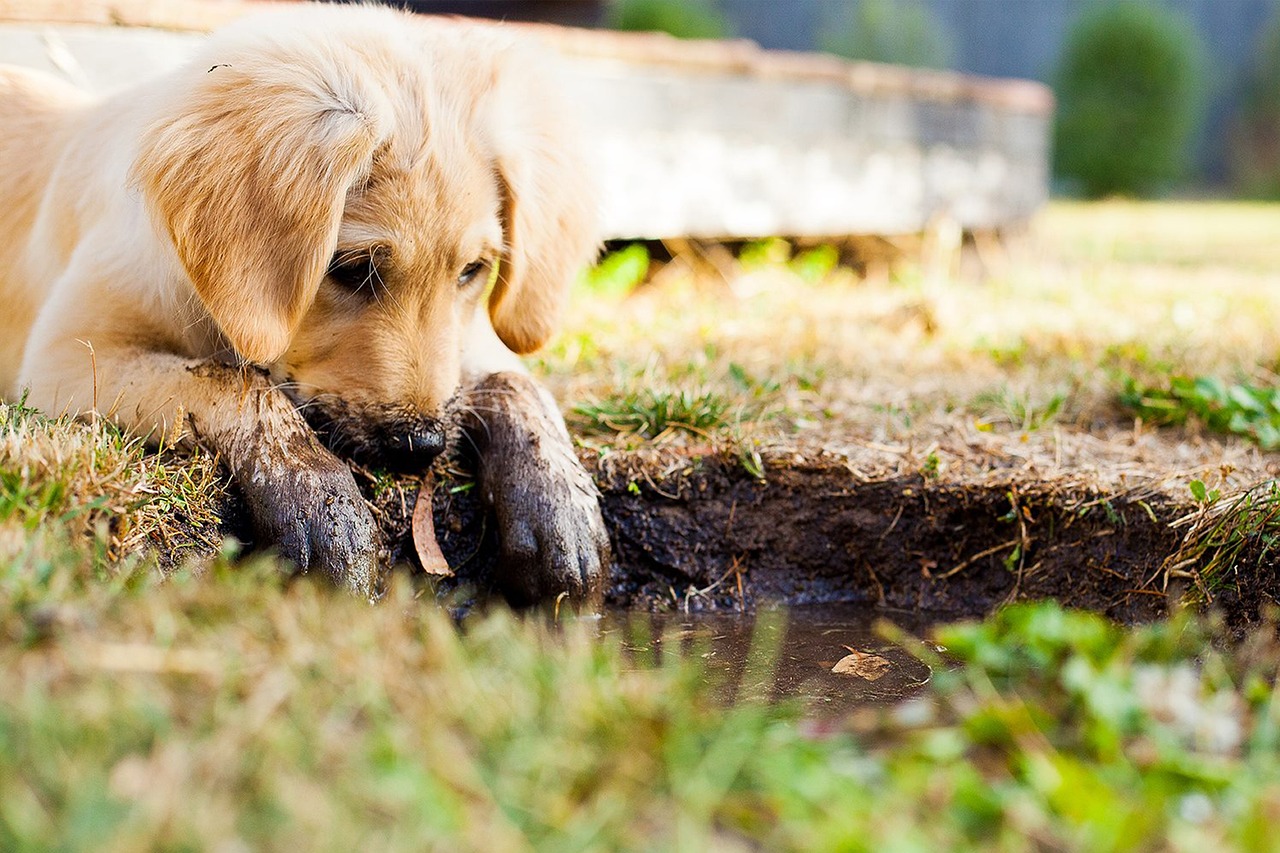
Preparing for Travel
When it comes to traveling with pets, especially for those who suffer from allergies, preparation is everything. It's like gearing up for a big game; you wouldn't step onto the field without your gear, right? The same goes for your travel plans. Before you even think about packing your bags, take a moment to assess your allergies and how they might be impacted by your destination. Consider the climate, the type of accommodation, and even the local flora and fauna. Knowing what you're up against can make a world of difference in your travel experience.
One of the first steps in your travel preparation should be to create a checklist of essential items to pack. This isn’t just any checklist; it should be tailored to your specific needs as an allergy sufferer. Here are a few critical items to consider:
- Allergy medications (antihistamines, nasal sprays, etc.)
- Personal cleaning supplies (wipes, hand sanitizers)
- Pet grooming tools (to minimize dander)
- Comfort items for your pet (to keep them calm during travel)
In addition to packing the right items, you should also think about your accommodations. It’s crucial to choose a place that is pet-friendly and allergy-aware. Look for hotels or rentals that advertise hypoallergenic environments or have strict cleaning protocols. This could mean the difference between a restful stay and a sneeze-filled nightmare. You might want to call ahead and ask about their cleaning practices and whether they use any specific products that might trigger your allergies.
Don’t forget to prepare your pet as well. Just like you, your furry friend might experience anxiety or discomfort during travel. Make sure to pack their favorite toys, a comfortable blanket, and any medications they might need. A happy pet can lead to a happier travel experience for everyone!
Lastly, consider the route you’ll be taking. If you’re driving, plan for regular stops to let your pet stretch and relieve themselves, while also ensuring that you’re not spending too much time in areas that might exacerbate your allergies. Planning your route can help you avoid high-pollen areas or regions known for specific allergens.
In summary, preparation is not just about what you pack but also about how you plan your entire travel experience. By taking the time to anticipate potential allergy triggers and preparing accordingly, you can ensure a smoother, more enjoyable trip for both you and your beloved pet. Remember, a little foresight can go a long way in making your travel experience enjoyable and comfortable.

Choosing Allergy-Friendly Accommodations
When it comes to managing pet allergies while traveling, one of the most crucial steps is selecting the right place to stay. Imagine arriving at your vacation destination only to find that your accommodations are riddled with allergens—what a nightmare! To avoid this, it's vital to do some homework before you book your stay. Start by looking for hotels or rentals that specifically advertise themselves as allergy-friendly. Many establishments now recognize the importance of maintaining a clean environment and may offer pet-free rooms or utilize HEPA air filters to keep the air fresh and allergen-free.
Another effective strategy is to read reviews from previous guests. Look for comments that mention cleanliness and allergy management. If you see a pattern of complaints about pet dander or dust mites, it's a good idea to keep searching. Websites like TripAdvisor and Booking.com can be invaluable resources for this. You could even reach out directly to the property to ask about their cleaning practices and whether they can accommodate your specific needs.
Furthermore, consider the location of your accommodation. Staying in a place that is close to parks or open spaces can be beneficial, as you can enjoy the outdoors without being confined in a space that might trigger your allergies. If you're renting a vacation home, inquire about the cleaning protocols and whether they use pet-friendly cleaning supplies that are less likely to cause allergic reactions.
Here’s a quick checklist to help you find the perfect allergy-friendly accommodation:
- Look for hotels that offer allergy-free rooms.
- Check for HEPA air filters in the accommodations.
- Read guest reviews focusing on cleanliness and allergen management.
- Contact the property to confirm their pet policies and cleaning practices.
- Consider the location to minimize exposure to outdoor allergens.
By taking these steps, you can significantly reduce the chances of an allergic reaction and ensure a more enjoyable travel experience. Remember, your comfort is paramount, and a little research can go a long way in making your trip stress-free. Happy travels!

Packing Essential Allergy Medications
Packing the right allergy medications is crucial when you're planning a trip with your furry friend. Imagine this: you're on a beautiful beach, the sun is shining, and suddenly, a sneeze escapes you. That's not the kind of surprise anyone wants while on vacation! To avoid such scenarios, it's essential to prepare your travel kit with the necessary medications to keep your allergies in check. Start by consulting with your doctor to ensure you have the appropriate prescriptions and over-the-counter options.
When packing, consider including antihistamines, which can provide quick relief from allergy symptoms such as sneezing, itching, and runny nose. These medications come in various forms, including tablets, liquids, and nasal sprays, so choose what works best for you. Additionally, having a supply of decongestants can help clear up nasal passages, allowing you to breathe easier when allergens strike. Don't forget about eye drops if you suffer from itchy, watery eyes; they can make a world of difference during your travels.
It's also wise to carry inhalers or other prescribed medications if you have asthma or more severe allergic reactions. You never know when you might encounter an unexpected allergen, so being prepared is key. Consider creating a travel checklist to ensure you don't leave anything behind. Here’s a simple table to help you visualize what to pack:
| Medication Type | Purpose | Notes |
|---|---|---|
| Antihistamines | Relief from sneezing, itching, and runny nose | Choose between tablets, liquids, or nasal sprays |
| Decongestants | Clear nasal passages | Useful during high pollen seasons |
| Eye Drops | Relief from itchy, watery eyes | Opt for allergy-specific drops |
| Inhalers | Manage asthma symptoms | Always have a backup on hand |
Moreover, it’s a good idea to keep your medications in their original packaging, as this can help avoid any confusion at airports or during your travels. Labeling your medications can also be beneficial, especially if you’re traveling with others. This way, everyone knows what you need and can help you stay on track. Lastly, don’t forget to check the expiration dates on your medications before you head out; nothing is worse than realizing your antihistamines expired last year when you need them most!
In summary, packing essential allergy medications is not just about bringing along a few pills. It's about ensuring you have a comprehensive strategy to manage your allergies effectively while traveling. With the right preparations, you can focus on enjoying your trip rather than worrying about your allergies. So, take a deep breath, pack wisely, and get ready for an adventure without the sneezes!
- What should I do if I forget my allergy medication? - If you forget your medication, seek a local pharmacy or clinic that can provide over-the-counter options or refill your prescription.
- Can I take my allergy medications on a plane? - Yes, you can take your allergy medications on a plane. Ensure they are in their original packaging and declare them if necessary.
- How can I manage my allergies if I run out of medication while traveling? - Try to avoid known allergens, maintain a clean environment, and consult a local healthcare provider for alternatives.
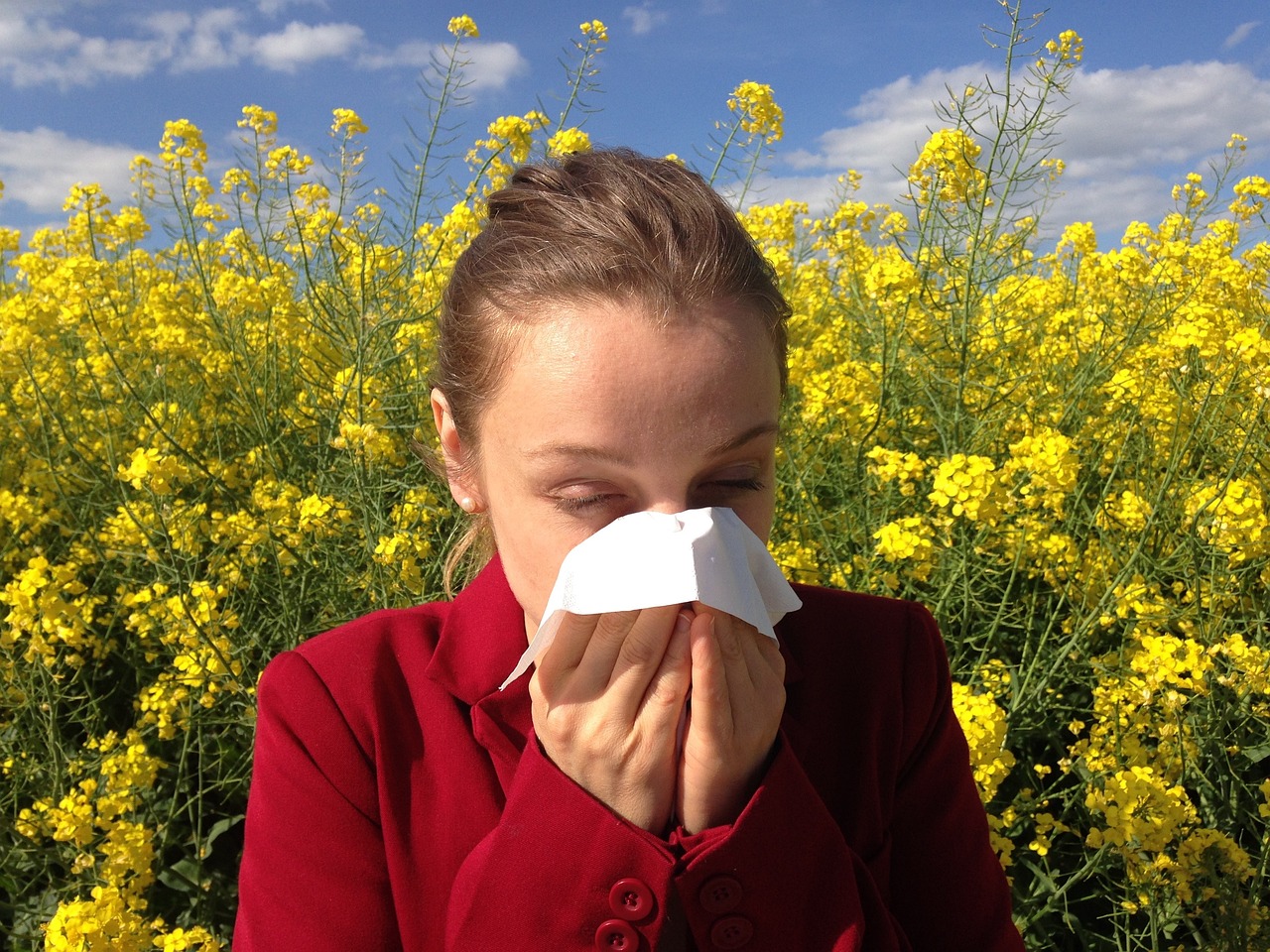
Managing Allergies During Travel
Traveling can be one of life's greatest pleasures, but for those who suffer from pet allergies, it can also feel like navigating a minefield. Imagine stepping into a beautiful hotel room, only to be greeted by the telltale signs of pet dander lurking in the corners. The sneezing, itchy eyes, and congestion can quickly turn a dream getaway into a nightmare. So, how can you manage your allergies while still enjoying your travels? The key lies in being proactive and prepared.
First and foremost, it's important to recognize that different locations may expose you to various allergens. Whether you're visiting a friend with pets or staying in a pet-friendly hotel, the potential for exposure increases. One effective strategy is to carry a travel-sized air purifier with you. These handy devices can significantly reduce airborne allergens in your immediate environment, allowing you to breathe easier. Just imagine the relief of having clean air circulating in your hotel room after a long day of exploring!
Another crucial aspect of managing allergies during travel is maintaining a clean environment. When you check into your accommodation, take a moment to inspect the room. Look for any signs of pet hair or dander, and don't hesitate to request a thorough cleaning if you notice anything amiss. A simple call to the front desk can make a world of difference. Also, consider bringing along some disposable cleaning wipes to quickly wipe down surfaces like nightstands and remote controls, which can harbor allergens.
When it comes to your travel routine, try to establish a few simple habits that can help minimize your exposure to allergens. For instance, always remove your shoes when entering your accommodation. This not only keeps the space cleaner but also prevents any allergens from outside from entering your sanctuary. Additionally, consider using a lint roller to pick up any stray pet hair on your clothing before you head out for the day. It's a small step that can make a big difference in your comfort level.
Traveling by car? Make sure to keep the windows closed and the air conditioning on recirculate mode to avoid bringing in outside allergens. If you're traveling with your pet, designate a specific area in the car for them to sit, and use a pet seat cover to contain any dander. This way, you can enjoy the journey without worrying about allergens infiltrating your personal space.
Lastly, don’t forget to stay hydrated and maintain a healthy diet while on the road. A well-hydrated body is better equipped to handle allergens, and a balanced diet can strengthen your immune system. Carrying a refillable water bottle and some healthy snacks can keep you feeling your best throughout your travels.
In summary, managing allergies during travel may feel daunting, but with a little preparation and awareness, you can enjoy your adventures without the discomfort of allergic reactions. Remember, the world is full of wonderful places waiting to be explored, and with the right strategies in place, you can experience them all!
- What should I do if I have an allergic reaction while traveling?
If you experience an allergic reaction, seek immediate medical attention if necessary. Always carry your allergy medications, such as antihistamines or an epinephrine auto-injector, and use them as directed. - How can I find pet-friendly accommodations that are also allergy-aware?
Look for hotels that advertise themselves as hypoallergenic or that have strict cleaning protocols for pet-friendly rooms. Reading reviews can also provide insight into other travelers' experiences. - Is it safe to travel with my pet if I have allergies?
It depends on the severity of your allergies. If you can manage your symptoms and your pet is well-groomed and dander-free, it may be possible. Always consult with your doctor before making travel plans.

Minimizing Exposure to Allergens
When it comes to managing pet allergies while traveling, is paramount. Imagine stepping into a new environment, only to be greeted by a wave of sneezing, itching, and discomfort. It can quickly turn a fun getaway into a miserable experience. So, how can you ensure that your travels remain enjoyable despite the presence of potential allergens? Here are some effective strategies.
First and foremost, maintaining a clean environment is essential. Whether you’re in a hotel room or a vacation rental, take a moment to assess the space. Dust surfaces and vacuum floors if possible. If you’re staying in a hotel, don’t hesitate to request a room that has been thoroughly cleaned and is free of pet dander. Many hotels now offer allergy-friendly rooms equipped with air purifiers and hypoallergenic bedding. This simple step can significantly reduce the amount of allergens you may encounter.
Next, consider your travel gear. Your luggage can inadvertently carry allergens from one location to another. To combat this, use hard-shell luggage that can be easily wiped down, and keep your bags off the floor in hotel rooms. Additionally, using protective covers for pillows and mattresses can create a barrier against allergens. This is especially useful if you’re staying in places where pets are allowed.
Another effective way to minimize exposure is to be mindful of your clothing. When packing, choose fabrics that are less likely to trap allergens. For example, opt for smooth, synthetic fabrics over cotton, as they can be easier to clean and less likely to hold onto pet dander. Once you arrive at your destination, changing into clean clothes can help reduce your exposure to allergens that may have clung to your travel attire.
While on the road, whether you’re driving or flying, it’s crucial to keep your vehicle or seat area clean. If you’re traveling by car, regularly vacuum the interior and consider using an air purifier. In airplanes, be sure to wipe down your seat and tray table with disinfecting wipes. It might seem like a small step, but it can make a world of difference in reducing your exposure to allergens.
Lastly, always carry allergy-friendly essentials with you. This includes items like hypoallergenic wipes, air purifiers, and even a small vacuum cleaner if you’re traveling for an extended period. By being prepared and proactive, you can create a more comfortable travel experience for yourself and your furry companion.
- What are common allergens to look out for while traveling? Common allergens include pet dander, dust mites, mold, and pollen. Being aware of these can help you take preventive measures.
- How can I ensure my hotel room is allergy-friendly? When booking, look for hotels that advertise allergy-friendly rooms and call ahead to confirm their cleaning protocols.
- What should I pack for my allergy management kit? Essential items include antihistamines, nasal sprays, and any prescribed medications. Don’t forget to bring wipes and a small vacuum if possible.

Communicating with Travel Companions
When it comes to traveling with pets, effective communication with your travel companions is crucial, especially if you or someone in your group suffers from pet allergies. Imagine embarking on a journey only to find yourself surrounded by a cloud of dander or an unexpected furry friend. Yikes! To avoid such scenarios, it’s essential to have open and honest discussions about allergy needs and preferences before hitting the road. This way, everyone can enjoy the trip without the worry of sneezing fits or itchy eyes.
First and foremost, it's important to clearly articulate your allergies to your companions. Let them know what specific triggers to watch out for. For instance, if you have a dog allergy, make sure they understand that bringing a dog along—or staying in pet-friendly accommodations—could pose a problem. This proactive approach not only helps in planning but also shows your companions that you value their understanding and support.
Additionally, consider creating a checklist of allergy-friendly practices that everyone can agree on. This could include:
- Avoiding pet-friendly accommodations if possible
- Bringing along air purifiers or allergy medications
- Setting rules for keeping the vehicle clean and dander-free
Moreover, it’s beneficial to have a designated point of contact within your travel group. This person can help ensure that everyone is on the same page regarding allergy management. Whether it's reminding others to keep windows closed or to avoid certain areas, having someone who is aware of your needs can make a significant difference.
Lastly, don't hesitate to express your feelings during the trip. If you start experiencing allergy symptoms, speak up! Your companions will likely appreciate your honesty and be willing to make adjustments to help you feel more comfortable. Remember, communication is a two-way street. Encourage your companions to share their concerns as well; perhaps they have allergies or sensitivities that need to be considered. By fostering an environment of open dialogue, you can ensure that everyone has a pleasant travel experience.
Here are some common questions travelers have regarding managing pet allergies:
| Question | Answer |
|---|---|
| What should I do if I start experiencing allergy symptoms while traveling? | Immediately communicate with your travel companions and take your allergy medications as prescribed. If symptoms persist, seek medical advice. |
| How can I ensure my accommodations are allergy-friendly? | Research hotels or rentals that specifically advertise as pet-free or hypoallergenic. Read reviews to gauge cleanliness and allergy management practices. |
| Is it necessary to bring my own air purifier when traveling? | While not mandatory, having a portable air purifier can significantly reduce allergens in your immediate environment, enhancing your comfort. |

Post-Travel Allergy Management
Returning from a trip can be both exhilarating and exhausting, especially for those who suffer from pet allergies. You might find yourself back in your cozy space, but lingering allergens can still wreak havoc on your system. So, what can you do to manage those pesky symptoms effectively? First and foremost, it’s essential to thoroughly clean your living environment. This means vacuuming carpets, washing bedding, and dusting surfaces to ensure that any allergens that may have hitched a ride home with you are eliminated.
After your travels, it’s wise to monitor your symptoms closely. Are you experiencing sneezing, itchy eyes, or a runny nose? Keeping a diary of your symptoms can help you identify potential triggers that may have followed you back. For instance, if you notice that your symptoms flare up after returning from a pet-friendly hotel, it could be a sign that dander or other allergens are still present in your space.
Another effective strategy is to maintain a clean home environment. Consider investing in an air purifier equipped with a HEPA filter. These devices are designed to trap allergens, providing you with a cleaner air supply. Additionally, regularly changing your air filters can significantly improve air quality. If you have pets at home, regular grooming and bathing can also help reduce dander and allergens.
Don’t forget about your personal items! When you return home, be sure to wash any clothing and luggage that may have come into contact with allergens. A quick wash can make a world of difference in reducing any residual exposure. If you traveled with your pet, give them a bath as well. This not only helps with their hygiene but also minimizes the allergens they may bring into the house.
Lastly, if your symptoms persist, don't hesitate to consult with a healthcare professional. They can provide tailored advice and may recommend specific medications or treatments to help you feel your best. Remember, managing allergies is a continuous process, and being proactive can make all the difference in your comfort and enjoyment of your home after a trip.
- What should I do if my allergies worsen after traveling?
If you notice an increase in allergy symptoms after your trip, consider consulting a doctor for personalized advice and potential treatments. - How often should I clean my home after traveling?
It’s best to do a thorough clean as soon as you return and then maintain a regular cleaning schedule to keep allergens at bay. - Can air purifiers really help with pet allergies?
Yes, air purifiers with HEPA filters can significantly reduce airborne allergens, providing relief for allergy sufferers.
Frequently Asked Questions
- What are the common symptoms of pet allergies?
Common symptoms of pet allergies include sneezing, runny or stuffy nose, itchy or watery eyes, and skin rashes. Some individuals may also experience coughing, wheezing, or shortness of breath, especially if they have asthma. Recognizing these symptoms early can help you manage them effectively while traveling.
- How can I prepare for my pet allergies before traveling?
Preparation is crucial! Start by packing essential medications such as antihistamines, nasal sprays, and any prescribed inhalers. It's also wise to research your destination for potential allergens and consider packing items like air purifiers or hypoallergenic bedding if you have specific sensitivities.
- What should I look for in allergy-friendly accommodations?
When searching for accommodations, prioritize places that advertise pet-free or hypoallergenic rooms. Look for hotels or rentals that emphasize cleanliness and have good reviews regarding their allergy management practices. It's also beneficial to inquire about their cleaning protocols and whether they use HEPA filters.
- How can I manage my allergies while traveling?
To manage your allergies on the go, maintain a clean environment in your vehicle or accommodation. Regularly vacuum and dust surfaces, wash your hands frequently, and avoid touching your face. Bringing along your own bedding or pillow can also help reduce exposure to allergens.
- What are some strategies to minimize exposure to allergens?
Reducing allergen exposure can be achieved by keeping windows closed in your vehicle, using air purifiers, and ensuring your travel companions are aware of your allergies. Additionally, try to avoid pet areas in public spaces and request non-smoking rooms, as smoke can exacerbate allergy symptoms.
- How important is communication with travel companions regarding my allergies?
Communication is key! Let your travel companions know about your allergies and any specific precautions you need. This way, everyone can work together to ensure a comfortable and enjoyable trip for all, which can make a world of difference in managing your allergies.
- What should I do after returning from a trip to manage allergy symptoms?
After your trip, it's essential to clean your living space thoroughly to remove any allergens that may have traveled home with you. Wash your clothes and bedding, and consider using an air purifier to help clear the air. If symptoms persist, consult with your healthcare provider for further advice.

